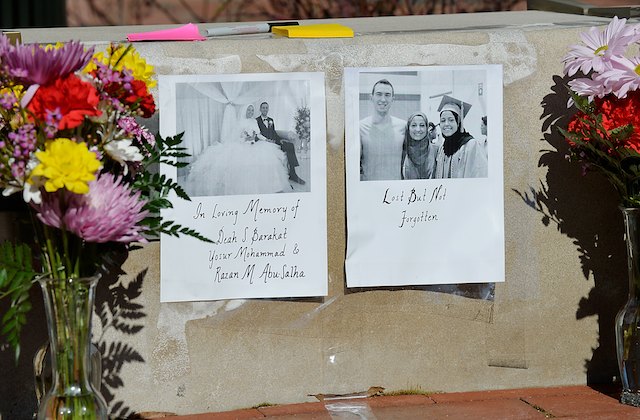Update, 3:40pm ET: President Obama has made his first public statement about the Chapel Hill shootings, calling the killings of Dean Barakat, Yusor Mohammad Abu-Salha, and Razan Mohammad Abu-Salha "brutal and outrageous." "No one in the United States of America should ever be targeted because of who they are, what they look like, or how they worship," Obama said in a statement," The Hill reported.
……………
While Chapel Hill, N.C., police continue to investigate Craig Hicks’ motives in the shooting deaths of Dean Barakat, Yusor Mohammad Abu-Salha, and Razan Mohammad Abu-Salha, the FBI has opened its own inquiry into the Tuesday night homicides.
The FBI’s inquiry should not be confused with a full investigation, the Washington Post reports. Rather, the federal agency will be doing a preliminary review of the evidence to figure out whether Hicks broke any federal laws when he killed Barakat, a 23-year-old student, his 21-year-old wife Yusor, and her 19-year-old sister Razan. While Chapel Hill police say all motives are on the table–in early remarks Police Chief Chris Blue said the shooting seemed to have its origins in a parking dispute. Outraged, the Mohammad sisters’ father called their killings the very definition of hate.
Regardless of what conclusions the FBI or local police come to, former UNC-Chapel Hill professor Omid Safi wrote for The Guardian, that we as a society must look beyond the narrow legal definitions of what constitutes a "hate crime." Vitriolic anti-Muslim sentiment in the post-9/11 era has cost real people their very lives. "The more important question is how we are going to introduce love and justice back into the public arena, and how to insist on the dignity and sanctity of all of our lives," Safi wrote.
And, in a final, heartbreaking note, StoryCorps segment allowed the public to hear Yusor Mohammad Abu-Salha’s own voice this week when it shared a conversation she had with her third grade teacher Mussarut Jabeen. "Although in some ways I do stand out, such as the hijab I wear on my head, the head covering," Abu-Salha said, there’s still so many ways that I feel embedd in the fabric that is, you know, our culture." Listen to the rest at NPR.
